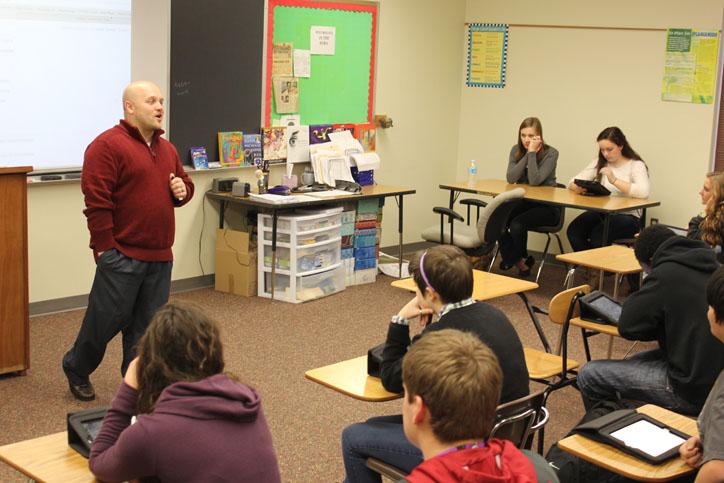School handbook undergoes approval process
Administration completes yearly revisions of course selection handbook
Jesse Dowell talks to his Advanced Placement (AP) Psychology class about preparing for the AP test at the end of the year. Next year, AP Psychology will be a dual credit class, meaning students will not need to take the AP test to receive college credit.
December 15, 2014
Last year, the social studies teachers reviewed their curriculum K-12 and decided to condense government, currently a year-long class for seniors, to one semester, rather than a year-long class. The second semester is being filled with a semester of economics. In order for this change to be made, it had to be approved by the board and subsequently, the course handbook has to be approved as well.
There are other things in the course handbook that are being changed. AP Psychology is going to be offered as a dual credit course in the 2015-2016 school year. This means that students who take it can receive high school and college credit. “Our teachers have to be certified to teach those DMACC level classes and we have to align the standards and benchmarks to DMACC,” Dr. Bruce Amendt, associate superintendent said.
Jesse Dowell, the AP Psychology teacher, finished earning his necessary 12 credits of psychology for his master’s degree over the summer. He does not think the curriculum will be immensely different from past years, but he thinks it will be a positive change. “I was not really pushed to do it,” Dowell said. ” I just saw it as something that would be beneficial for students to get the credit without paying $90 for the AP test. This way, it’s essentially free. I just thought it was a great opportunity.”
Along with AP Psychology and the government/economics combination, the Project Lead the Way course, an introduction to engineering class offered mainly for freshman and sophomores, will become a dual credit course as well. “The drawback of this is that a freshman in high school is going to start their college transcript,” Amendt said. “Some people will think this is very positive and others will think, ‘well what if I don’t do very well?’ Hopefully most people will view getting college credit at zero cost to the family as a positive opportunity.”
There are a couple of reasons why there may be changes made to the course selection handbook. The teachers and administrators can come up with ideas to provide additional resources or opportunities for students in their curricular reviews. “Every seven years a curricular area takes a look at their curriculum top to bottom,” principal Brent Riessen said. “They kind of lift up the hood, check the engine out and really go top to bottom with it.”
Another reason that the handbook may need to be altered is if there is a state law or requirement made that the school needs to meet, such as several years ago when schools became required by the state to teach students Cardiopulmonary Resuscitation (CPR). In order to do this, the school changed the content of the sophomore health class to fit CPR.
Junior Brenna Yeutsy took Intro to Engineering her freshman year and thinks that making it dual credit will be a positive change because she would have liked to receive the college credit without taking the test at the end of the course. “It would be good because it would convince more people to take the class because it’s a fun class and you get a different experience,” Yeutsy said.






